On November 27, 2020, my travel companion, "Lao Chen Shao Nian," and I embarked on a tour group trip to western Yunnan. The itinerary can be simply divided into three stages: the first is Mangshi, Ruili, and Tengchong. The second is the Nujiang Grand Canyon and the Dulong River. The third is Weishan, Nanjian, and Wuliang Mountain.
Because we were departing from Dali, we first flew from Shanghai to Kunming.

Airplane to Kunming
November 28:
Today is the day for registration, and we took the high-speed train to Dali early in the morning. Because last night's train tickets were sold out, I didn't want to pay the 145 yuan ticket, so I only bought a 60 yuan ticket this time. Once in Dali, I arranged my own itinerary: first visit the ancient city, then climb Cangshan Mountain, then visit the Chongsheng Three Pagodas, then go to Shenkan Pier, and stroll along the shores of Erhai Lake. At night, enjoy the ancient city's nightscape.


Scenery along the high-speed rail


Dali Ancient City Tower and Streetscape

Wuhua Tower, a Landmark Building in the Ancient City






Scenery in the Ancient City
"Without Cangshan Mountain, there's no Dali." Cangshan Mountain is one of our destinations. Hailing a taxi from the South Gate will get you to the Cangshan Gantong Temple Cable Car Station for just over 20 yuan.


Gantong Temple, located halfway up the mountain, was a natural place to steal something.



The autumn colors on the mountain are picturesque.


Cangshan Grand Canyon




Revisiting the Three Pagodas of Chongsheng Temple (I finally found a pond to take pictures of the reflection, but I didn’t know there was a “Reflection Park”?)
After leaving the Three Pagodas Temple, I wanted to take a walk by the Erhai Lake, so I randomly clicked on a shrine pier, called a Didi car and left. Surprisingly, I made the right choice. This is the Erhai Lakeside Promenade, the scenery is very nice!

Night view of the South Gate of the ancient city.

The clay pot fish at Yamuxuan Bai Folk Restaurant is still a favorite of Xiao Chen. Checked into the quaint Yilinge Hotel. November 29th: Today, I met up with four other tourists: a couple from Zhuhai, Guangdong, and a couple from Qingdao, Shandong. Our drivers were two, each surnamed He and part of the Naxi ethnic group. Our nine-seater car officially launched our 11-day exploration of western Yunnan. The first leg of our itinerary took us to Mangshi, Ruili, and Tengchong. We drove along the Hangzhou-Ruili Expressway, spending most of the day in the mountains. The weather was excellent, and Shanghai's long spell of cold weather vanished, giving way to a tropical landscape. The first attraction is the Tree-wrapped Pagoda, an ancient pagoda from the Qianlong era that is unexpectedly wrapped in a bodhi tree, a truly spectacular sight.




The Ruili "One Tree in a Forest" scenic spot on the national highway. (There is also a solitary tree forest attraction in Xishuangbanna)




A cuckoo takes over a bird's nest; the benefits and harms of a parasitic tree.
November 30th:
Last night, I stayed at the Shenglinxuan Hotel in Ruili. I even went around looking for dinner. Today, I'll visit some nearby attractions: Jiegao National Gate, One Village, Two Countries, and Mori Tropical Forest Park, before returning to Tengchong.

Morning in the border town of Ruili

The bridge across the border





This is the scenic spot.



There are also indigenous residents.



The "One Village, Two Countries" attraction bears witness to the deep bond between China and Myanmar.
The Mori Tropical Forest Park, located not far from National Highway G320, is a large area boasting a pristine ecology: towering trees, blooming flowers, cascading waterfalls, and fresh air. This tropical rainforest valley, with its combination of rainforest vegetation and cascading streams, exceeded my expectations.

Actually it is here


Moli Falls


Yunnan is home to many tropical plants, and the streams and waterfalls are also spectacular.
The Longjiang Bridge, a major traffic control project in southwestern Yunnan, is a spectacular sight, spanning 2,470 meters in length and featuring towers 170 meters high. However, I couldn't get close enough to capture the stunning view. (There's a deep canyon below.)


Driving over the Longjiang River Bridge
The Jiangdong Ginkgo Village Scenic Area is located 37 kilometers north of Tengchong City, adjacent to the National Volcanic Geopark. The scenic area encompasses four natural villages: Chenjiazhai, Baxin, Jiangyun, and Sihe. It is famous for its naturally contiguous ginkgo forest covering over 10,000 mu (approximately 16,000 acres) and its more than 30,000 ginkgo trees. We went at the right time and the scenic area was crowded with tourists.







December 1st:
Last night, we stayed overnight at the Heze Garden Inn in Chenjiazhai. We had free time in the morning and departed at 11:00. We used this time to explore the streets and alleys of the core area and took numerous photos, creating the impression of a land covered in gold, a city covered in armor. Today we have many attractions to visit. The nearby Volcano Park has been closed for repairs due to yesterday's accident. In the afternoon, we will visit the Western Yunnan Anti-Japanese War Memorial Hall and Dieshui Waterfall before heading to Heshun Ancient Town for overnight stay.


Morning light--------Photo taken on the mountain of Guyang Temple




1300-year-old Ginkgo King

Couple Tree

There was a live broadcast here last night



I took a photo

The unique scenery of Ginkgo Village is well-deserved and very impressive. In the afternoon, we visited the Yunnan-Western Anti-Japanese War Memorial Hall and the National Cemetery. In the early days of the War of Resistance Against Japanese Aggression, Yunnan organized the Yunnan Army to fight in the Battle of Shanghai, defended the rear areas during the war, and organized the Expeditionary Force, writing a heroic chapter in history. Today, many young compatriots, holding yellow flowers, bowed and observed a moment of silence at the martyrs' tombs to express their respect and grief. It was deeply moving. A strong youth means a strong China. May our motherland prosper year after year.





Scenic area gate


Small bridges and flowing water beside the ancient town


Rural scenery outside the ancient town



Tengchong has beautiful jade, and Heshun has even more.

December 2nd:
Today's itinerary includes not only the ancient town but also the Rehai Scenic Area in Tengchong, and then our overnight stay in Lushui, the capital of the Nujiang Lisu Autonomous Prefecture. At dawn, we set out to explore the area. Last night we headed west, today we headed east. We took in the Long Trail, Dragon Pond, Yuanlong Pavilion, the Li and Liu Ancestral Halls, and the Ai Siqi Memorial Hall.








The sun rises in the east, and the scenery continues.


The Li Clan Ancestral Hall is classical and solemn.

The mist in Longtan looks like a dragon emerging from the water.

The former residence of Ai Siqi, a modern Chinese philosopher.




Sulfur pools, the air is filled with the smell of rotten eggs.

Interstitial springs, the fountains can reach several meters and spray every few seconds.



Leave Tengchong, go to Baoshan, cross the Lancang River, and enter Provincial Highway 230, which is the Lisu Nujiang Autonomous Prefecture.




Passing Lushui City (also known as Liuku Town), the lights begin to come on.

We stayed at the Haodu Century Hotel under the overpass.
November 3rd:
Today we'll travel north along the Nujiang River Gorge, passing through Fugong and Gongshan, and finally reaching Bingzhongluo, Yunnan's northernmost city. This drive will be the longest of our trip. We'll drive deep into the canyon, with Gaoligong Mountain to the left and the Biluo Snow Mountain to the right. Along both sides of the Nujiang River, villages nestled in the clouds, nearby springs and waterfalls, and suspension bridges flashing before our eyes... Travel is all about the journey.


Century Suspension Bridge


Tiger Leap


Flying Stone, (1983 In the early morning of February 19th, a huge rock fell into the courtyard of the teachers' dormitory of Fugong National Middle School, but more than a dozen teachers sleeping in their beds were completely unharmed. Where the rock came from remains unknown. )










Scenery captured while driving


Stone Moon——Nature’s Uncanny Craftsmanship


Photo taken at the service area

The First Roar of the Nujiang River

Pine Trees in the River

The First Bend of the Nujiang River

Peach Blossom Island
 Bingzhongluo Viewing Platform
Bingzhongluo Viewing Platform
November 4th:
Today we will spend the day in Bingzhongluo. Bingzhongluo Town is located at the northernmost tip of Yunnan Province, just beyond which lies Zayu County in Tibet. It's also the gateway to Tibet and Deqin. Unfortunately, a few kilometers from the Tibet checkpoint, we encountered road construction and had to turn back.
Today's attractions include Shimen, Wuli Village, and Qiunatong.








In the early morning of Bingzhongluo, the mist is shrouded in mist, like a dream and a fairyland.

Shimenguan
Wuli Village is on the other side of the river. It's a small village with a cable bridge leading to the other side. According to fellow hikers, it's best to go early in the morning, when the fog from the river shrouds the village, appearing and disappearing, creating the most beautiful view. Unfortunately, the two drivers weren't photography experts; they just took us here and that was it. There's also the ancient Tea-Horse Road leading to Tibet, built along the mountainside and very dangerous.


Wuli Village on the other side of the river


Suspension Bridge and Caravan





An original ecological village, far away from the world.


The Ancient Tea Horse Road
As you drive further up, not far away is the "Qiuna Tong". In the language of the Nu and Lisu people, the barrel means peace and safety, and its extension means a place of settlement. This is the heart of a big mountain, with large green fields exposed in the chest and belly, stilted buildings and stone slate houses, as if you have stepped into a fairy tale paradise.

Temple + church at the entrance of the village



Green field



An ancient village


Visit the temples near Bingzhongluo again
November 5th:
Today we will go to the mysterious Dulongjiang River. Before leaving, the driver said that the road was difficult to walk and that a nine-seater car could not pass. He did not want to go. After many negotiations, he finally dispelled his doubts. In fact, the road is really easy to walk (maybe because of the opening of the tunnel)
Dulong River is on the other side of Gaoligong Mountain. To the east is Gaoligong Mountain and to the west is Dandanlika Mountain. It forms a world wonder of four rivers flowing side by side. Because of the lack of traffic and the unique landscape, it has become a place where travel friends compete to check in.

Passing by the First Bay


Take a group photo

Crossing Gaoligong Mountain



Mountain Y Pass, the weather is endless


It snowed a few days ago, making it even more enchanting.
After four or five hours of driving, we finally arrived at the place "Pukawang". In fact, Pukawang is a tourist distribution center. When the car arrives here, the driver rests and the tourists herd the sheep.



Colorful road



The Dulong River is clear and turquoise water.




Suspension bridge, village with wooden houses (over the mountain is Myanmar)


A scene in Dulongjiang Town
November 6:
I didn’t go to Longyuan Village, I didn’t see the tattooed girl, and it was too late to return to Gongshan County. I checked into the Suyun Hotel with regret, and went to collect the scenery early in the morning. I took a walk around the Nujiang River and saw the cliff carvings. Today we will return to Zhiziluo and Laomudeng.


Gongshan County Riverside Square


Near Shi Yueliang Service Area
Zhiziluo used to be the seat of Bijiang County. In 1954, the Lisu Autonomous Prefecture was established and it was also the seat of the state government. In 1974, the state government moved and it became an abandoned city. So if you want to see the architectural style of the 1960s and 1970s, this place has become a living fossil. However, I think the history and scenery are even better here.

Towns built on high mountains


The market still exists, but it was not easy in the past.




The road across the canyon is more difficult than the Shu Road (photo taken by climbing to the top of the toilet)


Abandoned and deserted house

Church
Laomudeng is a Nu language, meaning purple bamboo land. It is located on the hillside on the east bank of the Nu River, not far from Zhiziluo. The scenery here is beautiful, and the whole village looks like a farmhouse, with hotels and residences everywhere. We stayed in the "Shanju Gega Inn", which was a mountain-view room. Sitting on the balcony, we had an unobstructed view of the entire Nu River Gorge. In the evening, six friends gathered nearby for dinner and had a great time cooking old hen stew.


Yellow third floor is also

Absolutely OK!


Downstairs facilities


Laomden Church

The Biluo Snow Mountains behind

Huangkou Peak of Gaoligong Mountain in front

Laomudeng Observation Deck

Light and Shadow in the Evening
November 7th:
Today we will leave Laomudeng and go to Weishan Ancient City in Dali Prefecture. The car drove along the Nujiang Grand Canyon, passed Lushui, and passed Dali. The only scenic spot on the way was the famous "Bath House".
The ancient city of Weishan was the capital of the Nanzhao Kingdom. It was later moved to Dali City. This is the birthplace of the Nanzhao Kingdom. There are many things to see. Overnight at Weishan Menghua Hotel.

You can see relocation of public housing along the way

The sightseeing trail is under construction



A hot spring bath on the Nu River. Every New Year, this place is overcrowded, with men, women, and children all naked to wash away the bad luck of the year and welcome the new year.

Driving through Lushui City, you will see a new atmosphere.







Photos taken in the car.
Especially when approaching Weishan, the land stretching for 10 kilometers is the most fertile land I have ever seen in Yunnan, and it is also the most beautiful pastoral scenery.
The ancient city of Weishan is located. Weishan County, south of Dali, is also known as Nanzhao Ancient City. It was the early capital of the Nanzhao Kingdom. The buildings in Weishan Ancient City are well preserved, including Gongchen Tower, Xinggong Tower, Xuanzhu Temple and other historical relics with southwest characteristics. It can be said that its streets are the first-class museum of the ancient Nanzhao Kingdom.

The only remaining North Gate Tower


The Star Gong Tower is located in the center of the ancient city

Stone Road, Commercial Street

The former imperial city, the past county government, the current government


Mengyang Park


Night view of the ancient city
November 8:
Continue sightseeing in the ancient city in the morning. As soon as it gets light, we will go to Mengyang Park, Ximen Diaolou, Confucian Temple, Weishan Museum, Xie Family Courtyard, etc. At 11 o'clock, drive to Nanjian Tulin Scenic Area, then go to Wuliang Mountain to watch cherry blossoms, and stay at Luoyuanju Hotel in Wuliang Town.




Old house in the city

West Gate Suspension Bridge


Confucian Temple

Nanzhao Museum (Weishan Museum)

Sun Palace

Ming Dynasty screen in the collection

Historical boutique

Twin Towers


Two styles of architecture in the city

Xie Family Courtyard



North Gate
Nanjian Earth Forest is located in Nanjian County, Dali Prefecture. First climb up the mountain to the Wanshou Pagoda, then turn into the earth forest, and then walk along the plank road. This is an art palace of natural sculptures, like entering a magical and unpredictable wonderland. Not charging admission is also a must.

Wansi Pagoda

Nanjian County
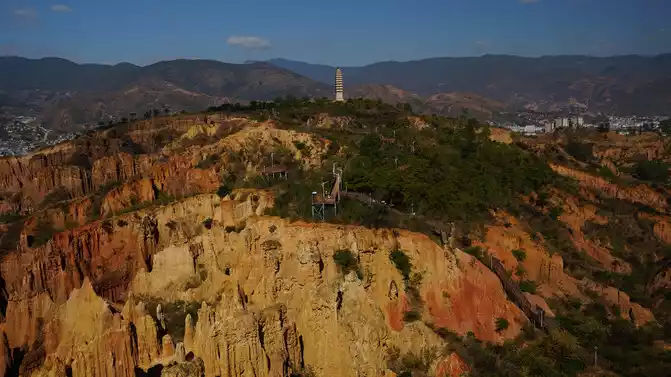



It is as wonderful as a sheng and a curtain.



Wuliangshan Cherry Blossom Valley is located in Wuliang Town, Nanjian County, Dali Prefecture. The average altitude is 2,175 meters. From November to December every year, tens of thousands of winter cherry blossoms planted in the tea gardens bloom, forming a fairyland on earth with thousands of trees covered with bright red spots.

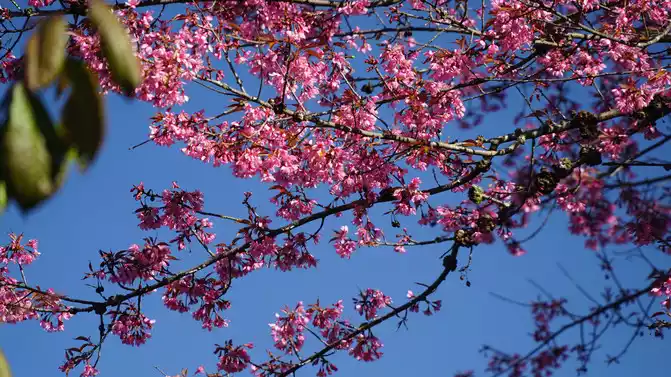
The time is still a little late (the buds have faded)


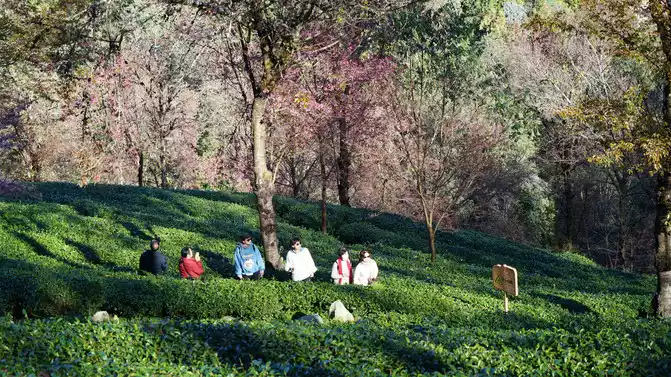


Sakura in the tea garden



Sakura in Scenic Spot No. 2
November 9th:
Today is the last day of the group tour. We went to Wuliang Mountain to take pictures of the sunrise before dawn, and then returned to the hotel for breakfast. Arrive in Dali around 2pm and the group will break up.
Our flight is on the evening of the 10th, from Kunming to Shanghai, which means we have one day available. We set our next goal at Shuanglang Ancient Town in Dali.
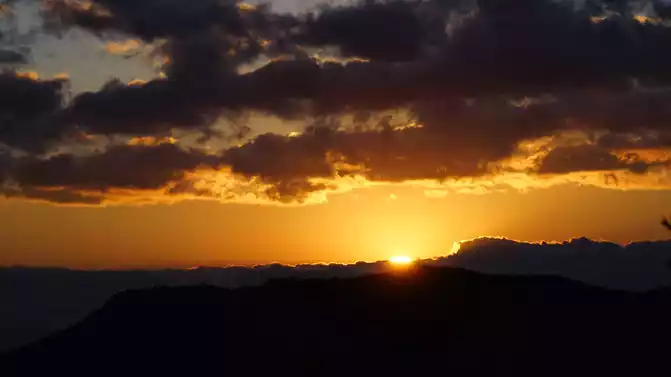
Taken from the No. 2 Observation Deck at sunrise

The mountain is red


As the sun rises, the cherry blossoms are even more red and lovely in the dark green tea garden.
After the group members arrived in Dali, some flew back to Qingdao on the same day, and some participated in the second trip. The two of us took the shuttle bus from Dali North Passenger Transport Station to Shuanglang Ancient Town and stayed at the "Spring Blossoms and Seaview Inn". I stayed in a sea view room for 164 yuan and was very happy.


Our hotel
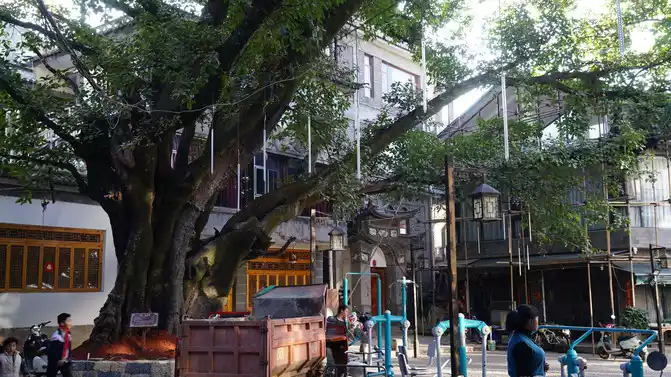



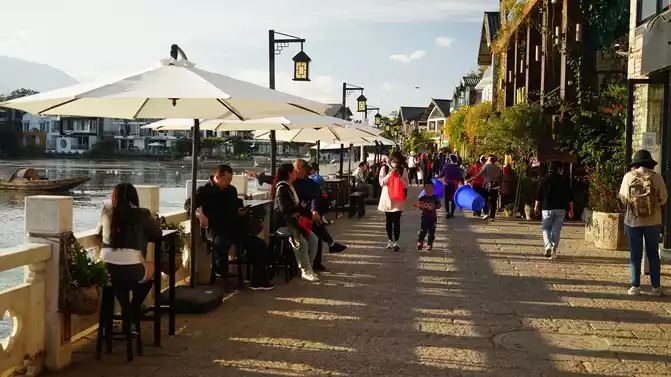
After checking in, go shopping in Yuji Island and other places. This is the best time. Shuangkuo Town deserves to be the best holiday destination!


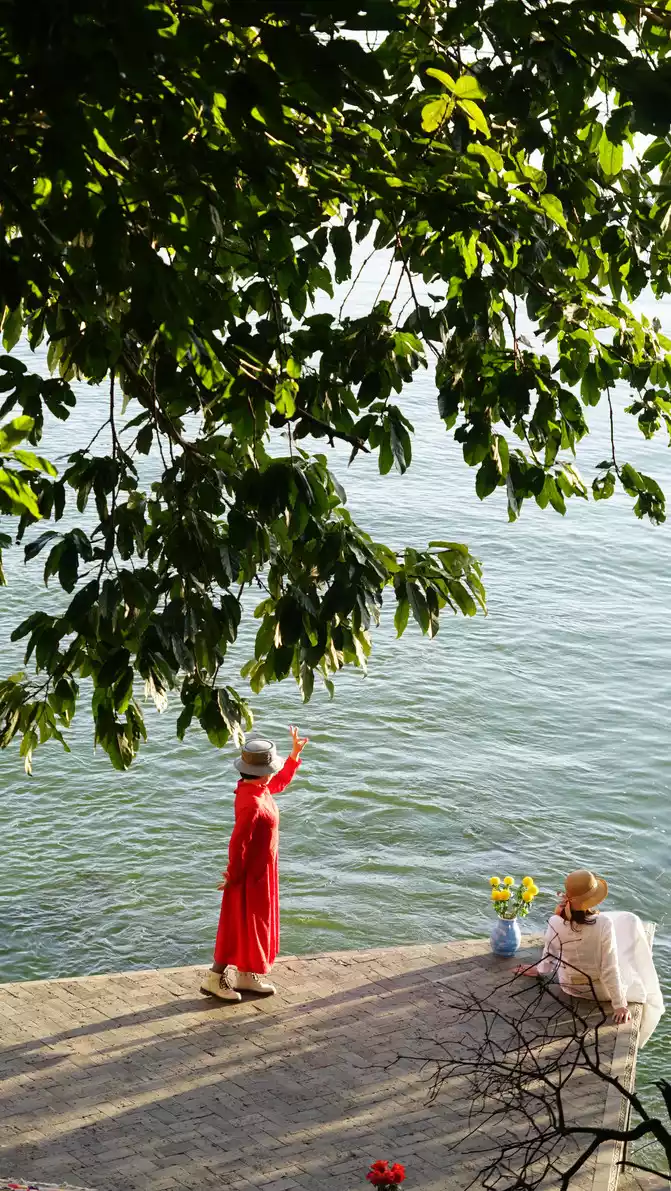
Sun Palace——Yang Liping’s Art Palace

Evening
November 10th:
Early this morning, we went to collect the wind again and visit the observation deck. Temples, vegetable markets..., I made an appointment with an online car-hailing service at 10 o'clock, shared the car to Dali Station, took the high-speed rail to Kunming, and then the subway to Changshui Airport, all the way connected and smooth.
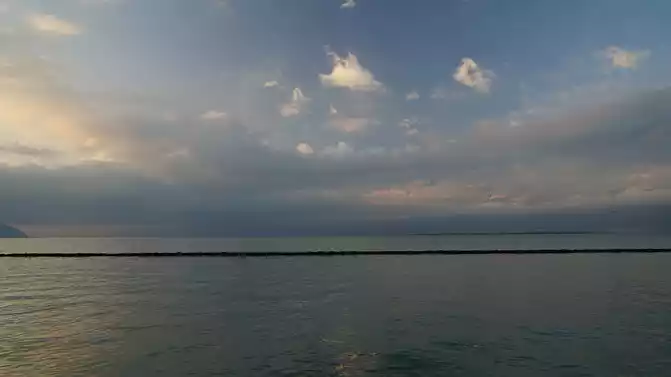


Morning in Erhai Lake



Photography of local customs and customs

"Nanzhao Style Island" taken from the observation deck
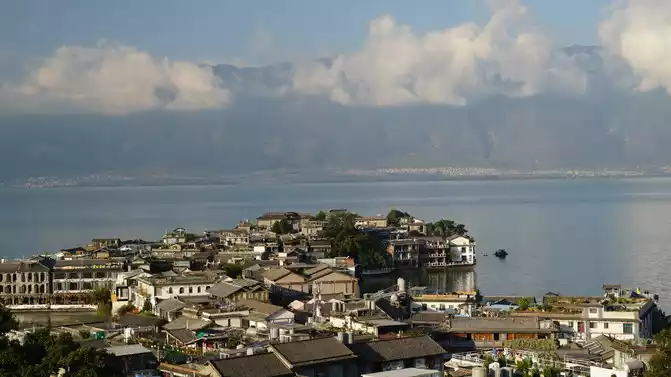
Cangshan Mountain opposite Shuanglang Town

Yesterday the shuttle bus took the west route around the sea, and today the online car-hailing service took the east route around the sea. It is equivalent to visiting the entire Erhai Lake in one day. (End)
Number of days: 2 days, Average cost: 1,000 yuan, Updated: 2023.04.30
Number of days: 1 day, , Updated: 2020.08.12
Number of days:3 days, Average cost: 2000 yuan, Updated: 2023.09.07
Number of days: 5 days, Average cost: 4500 yuan, Updated: 2020-05-17 21:43
Number of days: 1 day, Average cost: 300 yuan, Updated: 2020-06-16 22:40
Number of days: 4 days, , Updated: 2025.04.10